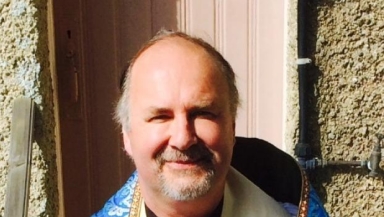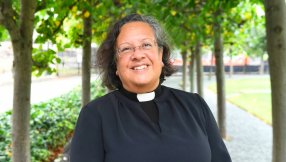
The Queen's former chaplain, Gavin Ashenden, is leading a group of rebel conservative clergy which is threatening to break away from the Church of England over sexuality issues.
In a letter published in today's Daily Telegraph, the group of 23 warns of the prospect of a 'declaration of independence' from vicars who feel that those with traditional views are being 'marginalised' by the Church's leadership.
They claim that decisions by the General Synod – the Church of England's equivalent to a parliament – have caused 'great concern' among Anglicans. They write: 'There are times, particularly in the face of social disintegration, when it is the duty of the Church to be counter-cultural.'
The letter adds that the 'booing of traditionalists' and the 'personal abuse' that they endured at the synod had 'deepened mistrust' between the two camps.
Other signatories of the letter include former Bishop of Rochester, Michael Nazir-Ali, and the head of Christian Concern, Andrea Williams.
The letter tells the Church of England to brace for a 'revolt in the form of an independence movement' unless there is a change of direction.
It concludes by raising the prospect of a split in the Church of England, similar to that which took place in the North American Anglican church.
Ashenden told the Telegraph that the Archbishop of Canterbury, Justin Welby, was 'under notice'. He said: 'This is a warning that the Archbishop is under notice that unless he leads the Church in a way that remains consistent with the values and authority of the Bible, as opposed to progressive secularism, he will risk some kind of revolt in the form of an independence movement.'
A Church spokesman said: 'Synod often debates controversial issues and members can sometimes disagree strongly with each other. That is the nature of debate.'
Ashenden this morning told Christian Today: 'The Church of England is doing the splits as it is led in an increasingly progressive and secular direction over gender issues. It is mistaking being kind and compassionate for discipleship. We should always be kind and compassionate, but by giving people what God wants them to have , not what they want Him to want them to have.
'This is not so much about sex, or gender, as about obedience and integrity. It is, as usual for Christians, the struggle between the zeitgeist, the spirit of the age, and the Holy Spirit. If the Church of England continues down this road of accommodation with the practice of gay marriage it will lead to there being two kind of Anglicans in this country. One group who keep faith with the teaching of Christ and the Scriptures, offering the kindness and compassion of faithfulness to God, and one who keep faith with secularism, and also offer kindness and compassion, but of a shallower kind that does not carry people closer to God.'
The Telegraph letter comes after 21 conservative Anglican clergy separately condemned the general synod for allowing 'tragic developments' when it voted to condemn so-called gay 'conversion therapy' and to consider liturgical support to Christians who 'transition' from one gender to another.
The statement, reported last week by Christian Today, said that 'we, as some of those committed to the renewal of biblical and orthodox Anglicanism have already started to meet, on behalf of our fellow Anglicans, to discuss how to ensure a faithful ecclesial future'.
Referring to the votes passed at synod in York earlier this month, the statement says: 'Many will share our dismay at the recent decisions...and the pursuing principles, values and practices contrary to Holy Scripture and church Tradition.
'Given the persistent failure of the majority of the House of Bishops to fulfil the God-given duties which they have sworn to discharge these tragic developments were, sadly, not wholly unexpected.
'Accordingly, and in preparation for such eventualities we, as some of those committed to the renewal of biblical and orthodox Anglicanism have already started to meet, on behalf of our fellow Anglicans, to discuss how to ensure a faithful ecclesial future. We now wish that we have done so to be more widely known.
'...We will meet again, as planned and with external facilitation, mediation and episcopal advice, in October. It is our intention to welcome on that occasion an even greater diversity of contributors.'
The signatories included Ashenden, the leading evangelical Susie Leafe, who is director of the conservative group Reform, Rt Rev Andy Lines, ACNA Bishop with Special Mission, James Paice, a trustee of the Southwark Good Stewards Trust and Andrew Symes, the executive secretary of Anglican Mainstream.
Ashenden last week told Christian Today he was concerned about 'a change of culture as regards sexual ethics' and an 'unfaithful and secularised' form of Anglicanism. He also accused bishops of reneging on their duties to stand up for the Christian faith.
Ashenden said: 'I signed this document because that I believe despite Archbishop Welby's promises that he does not plan to oversee any formal change of doctrine, it is intended that there should be a change of culture as regards sexual ethics, abandoning those the Church should be committed to and replacing them with others that are in complete opposition to both Scripture and dominical teaching. If anyone had any doubt about this before the last General Synod, there can be no doubt about it now. It becomes a bit of casuistry to say that there are no plans to change formal doctrine while encouraging change in liturgy and culture.
'The Bishops of the Church of England – who voted almost unanimously in favour of these changes – have reneged on their primary responsibility to defend and articulate the Christian faith. That leaves a vacuum of episcopal oversight that will need to be addressed. I look forward to working with others to remedy that in a way that will lead to a renewed faithful Anglicanism in this country in contrast to an unfaithful and secularised one.'













